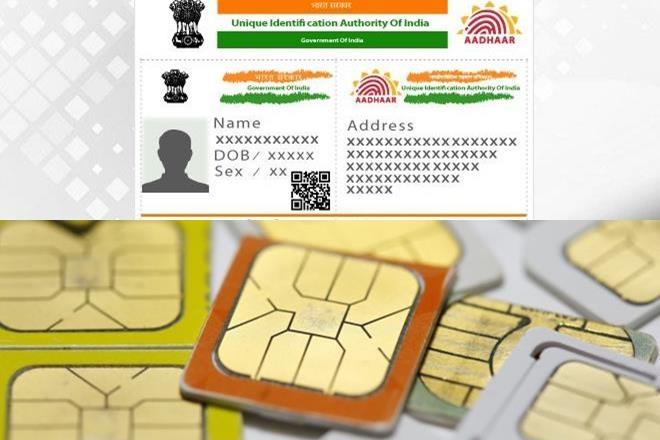Modi Govt Lied About Aadhaar-SIM Linking, Comes Clean Before Supreme Court

Image Courtesy: The Financial Express
So the Modi government has been caught lying about Aadhaar yet again — albeit this time the government admitted it before the Supreme Court on the 33rd day of the final hearings on the constitutional validity of Aadhaar.
For months, the BJP-led NDA government told the people that the Supreme Court had ordered the mandatory linking of SIM with Aadhaar — as those pesky messages, bordering on the dire, from your mobile service providers would have told you.
But on 25 April, senior counsel Rakesh Dwivedi admitted that the Supreme Court had not given any such order, after the five-judge Constitution bench pointed this out.
Dwivedi was discussing the Department of Telecommunication (DoT) notification, dated 23 March 2017, which asked telecom operators to conduct an Aadhaar-based re-verification of all existing pre-paid and post-paid mobile numbers through the e-KYC (Know Your Customer) process.
The notification said the direction was issued ‘in the light of the order dated February 6, 2017, of the apex court in Lokniti Foundation v. UOI’.
However, Justice Chandrachud pointed out that the Supreme Court had not asked for the Aadhaar-based e-KYC process in the 6 February 2017 Lokniti order.
Dwiwedi agreed, admitting that the Aadhaar-SIM linking had been recommended by the Telecom Regulatory Authority of India (TRAI) before the Lokniti order had come out, and that the government had issued the directions based on the TRAI recommendations.
Instead, Dwiwedi cited an 1885 legislation regarding the telegraph — the Indian Telegraph Act — to submit that the central government had a legal basis to issue such directions by virtue of the First Proviso to Section 4(1) of the Act, which says the Centre “may grant a licence, on such conditions and in consideration of such payments as it thinks fit, to any person to establish, maintain or work a telegraph.”
So what was the Lokniti order?
Lokniti Foundation had filed a petition that “there should be a definite mobile phone subscriber verification scheme, to ensure 100% verification of the subscriber”. It asked the court to pass an order requiring the identity and address of each subscriber to be verified, “so that no fake or unverified phone subscriber, can misuse a mobile phone” for “criminal” or “terrorist” activities.
After a notice was issued to the Union government, the government filed an affidavit stating that the telecom department had launched an ‘Aadhaar based E-KYC for issuing mobile connections’ on 16th August 2016. Under this, the customer as well as the Point of Sale (PoS) Agent of the telecom service provider would be authenticated from the Unique Identification Authority of India (UIDAI) based on their biometrics and demographic data. In fact, the government also submitted that “Aadhaar card or biometric authentication is not mandatory for obtaining a new telephone connection”.
Indeed, as the bench pointed out to Dwiwedi, the order had merely recorded the then Attorney General Mukul Rohatgi’s submission that Aadhaar was being used for verification of subscriber identity — but the court did not “order” or issue any direction requiring that Aadhaar-based re-verification process be done.
In the 6 February 2017 order, the court had only said that it was “satisfied” with the government’s submission that “an effective process has been evolved to ensure identity verification” and that “within one year from today, a similar verification will be completed, in the case of existing subscribers”. The court had said that it hoped “the undertaking given to this Court, will be taken seriously, and will be given effect to, as soon as possible”.
So how did the government construe this to mean that the court had ordered mandatory seeding of mobile numbers with Aadhaar?
As Justice Chandrachud said, there was no such direction from the Supreme Court, but the government took the Lokniti order and used it as a “tool” to make Aadhaar mandatory for mobile users.
In fact, in September 2017, Union law minister Ravi Shankar Prasad himself had said on Twitter that the Supreme Court had made it compulsory to link mobile numbers with Aadhaar, after some people questioned the move.
Of course, this is not the first time that the Modi government has lied to the public — and even to court, apparently — about Aadhaar.
It has been revealed that the the Unique Identification Authority of India (UIDAI) had been fudging data to show how Aadhaar has helped eliminate duplicate or “ghost” beneficiaries of welfare schemes, to support the Modi government’s claims — and those trumped-up figures were even presented before the Supreme Court in September 2015.
In fact, the government’s claims of weeding out “ghost” beneficiaries and the resulting in huge savings, by virtue of linking Aadhaar to the Public Distribution System and other welfare schemes, has earlier also been debunked through the Right to Information (RTI) enquiries.
Get the latest reports & analysis with people's perspective on Protests, movements & deep analytical videos, discussions of the current affairs in your Telegram app. Subscribe to NewsClick's Telegram channel & get Real-Time updates on stories, as they get published on our website.
























